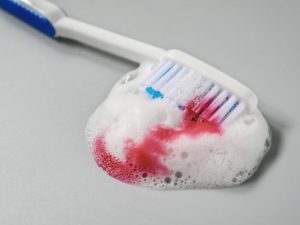
Do your gums bleed when you brush or floss? It can be a startling sight to see blood in your mouth or sink after cleaning your teeth, but it’s no reason to panic. However, easily bleeding gums shouldn’t be ignored either. While it could be the result of something as simple as using the wrong toothbrush, bleeding gums could also be a warning sign of an underlying health condition you need to check out. Read on to learn from your Lincoln dentist what might be causing your gums to bleed and what you can do about it.
What Causes Gums to Bleed?
Unfortunately, there are a variety of things that may be causing your gums to bleed:
- Your brushing and flossing routine: Using too much force or a hard-bristled toothbrush to clean your teeth can irritate your gums and cause them to bleed. Also, if you’re just starting to floss regularly, you may experience some bleeding until your gums adjust.
- Serious underlying health conditions: Bleeding gums can be an early warning sign of other health conditions developing in the body, like diabetes, leukemia, and thrombocytopenia.
- Gum disease: The most common cause of bleeding gums is a buildup of plaque and bacteria along the gumline. This eventually evolves into a bacterial infection in the gums known as gum disease. Not only does this common condition result in inflammation and bleeding, but it can also lead to tooth loss and an increased risk of heart disease.
How Can Bleeding Gums be Treated?
Whatever is causing your bleeding gums, you should talk to your dentist right away. After checking other factors like your vitamin levels, medication usage, and lifestyle, your dentist will likely suggest a treatment aimed at reducing the amount of inflammation and bacteria in your gum tissue, like:
- An improved dental routine: Brushing gently for two minutes twice a day is sometimes all that’s needed to restore your healthy gums. Continue to floss daily even if it initially causes bleeding, since this should quickly pass as your gums get healthier.
- Specialized oral health products: Ultra-soft toothbrushes and nonabrasive toothpastes can ensure that your cleaning habits aren’t causing your teeth damage as well. Your dentist may recommend an antiseptic mouthwash to combat any oral infections.
- Periodontal disease therapy: If the bleeding is caused by a bacterial infection, there are several ways your dentist can use periodontal disease therapy to help. One is called scaling and root planning, which essentially works as a deep clean for your mouth to remove the harmful bacteria. In more severe cases, antibiotic therapy or gum surgery may be needed to fully eliminate the disease and restore your gums.
The best way to keep your gums from bleeding in the first place is to regularly see your dentist for checkups and cleanings. With their help every six months, you can protect your gums from bacteria, treat developing issues as early as possible, and maintain that happy, healthy smile!
About the Practice
If you’re concerned about your bleeding gums, we encourage you to come see us at Olberding Dental in Lincoln, NE. Dr. Louis Olberding can identify the root cause and help you overcome it. Additionally, since more than half of Americans suffer from gum disease, he is proud to offer effective periodontal disease therapies like scaling and root planning as well as antibiotic therapy. If you want to keep your gums healthy and get your oral hygiene back on track, feel free to contact him via his website or (402) 488-2325.
